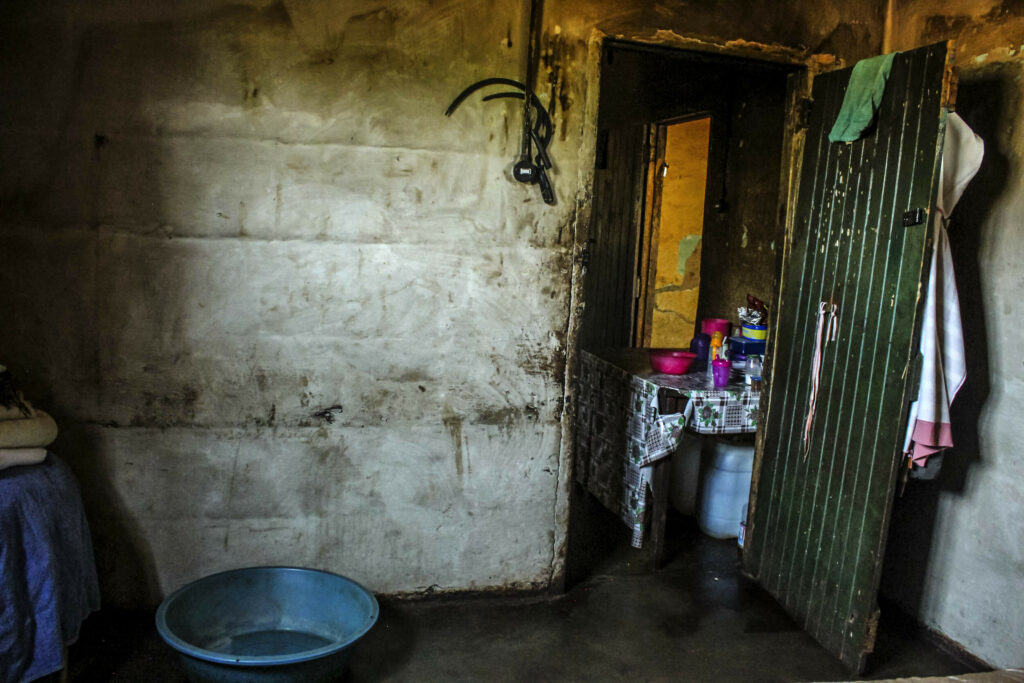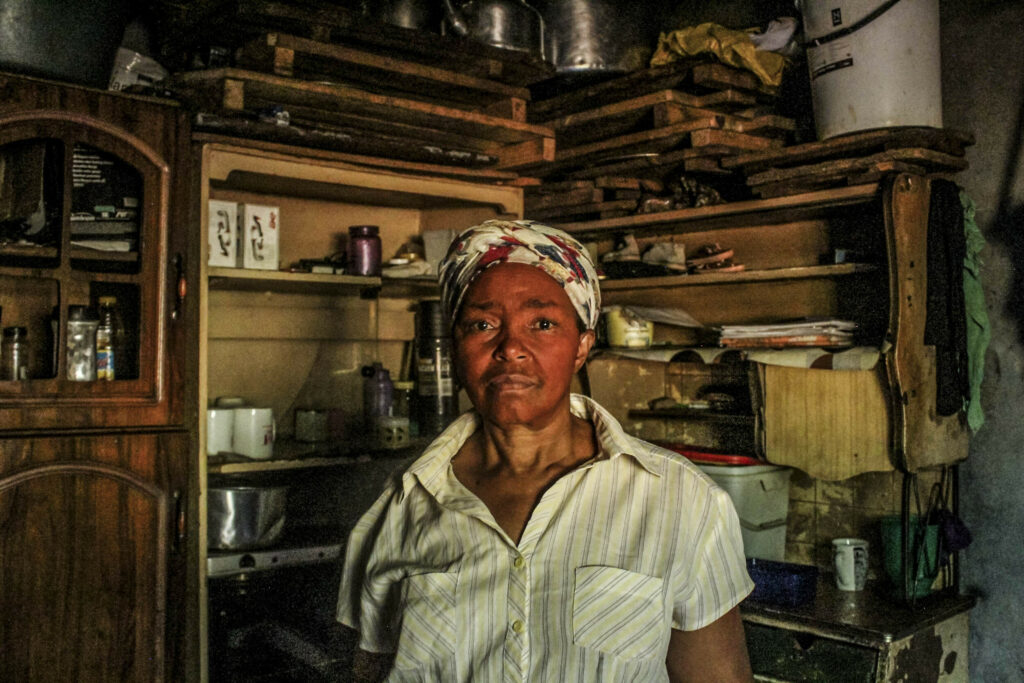The eviction order served to the Gumede family after they were evicted.
After 70 years living, working and raising her family on a farm in Greytown, Makhosazana Gumede was evicted, together with her family.
Gumede, who started working on the farm at the age of 10, had to stop working because of old age. It was on this farm that her late husband was born. Here they married and were able to raise a family while working diligently on the land. “That land is our home. Our ancestors are buried on that land, and now we aren’t even allowed near it,” complained Bonginkosi Gumede, one of her sons.
He described the day his mother was removed from the land she had known all her life. “There was a heavy police presence. One would swear they were there to pick up a vicious murderer, but no, they were there to evict an old pensioner and her children,” an anguished Gumede said, recounting the day they were evicted from their 10-room home.
Clarissa Pienaar, a lawyer representing Reinhard Ortmann who is a trustee of the trust that owns the Kruisfontein farm, from which the Gumede family was evicted, said the family applied to have the Gumedes removed based on an urgent removal and not an eviction order. Pienaar said Ortmann needed the family removed so that he could build a fire belt on the farm to comply with the terms of their insurance agreement. She denied that the Gumedes were evicted and said that they infringed on the rights of their client as the owner of the land and that this is why they were “removed”.
 Dorris Mchunu shares this small four roomed house with her sisters. The family has been threatened with eviction and say they have no where else to go if they get evicted. (Tshepiso Mabula ka Ndongen)
Dorris Mchunu shares this small four roomed house with her sisters. The family has been threatened with eviction and say they have no where else to go if they get evicted. (Tshepiso Mabula ka Ndongen)
She claimed that the Gumedes acted violently, and accused the Landless People’s Movement of South Africa of advising people to contravene the law, warning the group should not be taken seriously.
On Thursday, Pienaar sent the Mail & Guardian a letter warning that should defamatory statements be made about their clients, who removed the Gumede family after decades on the land, they would pursue legal action.
But Makhosazana Gumede denied Pienaar’s allegations and called for the return of her belongings, which were locked in the house when they were evicted. “We have been hard done, and it’s not right,” she said.
After the dramatic eviction, the family found shelter at the uMshwathi municipal office before finally moving into a three-roomed house not far from the Kruisfontein farm in the New Hanover area of KwaZulu-Natal.
The Gumedes are one of many families in KwaZulu-Natal who have been evicted from farms. Many have similar stories, such as the Zakwe family, who are also part of an eviction action, in their case initiated by Phillip Grant Meyer, the son of their parents’ former employer.
 Belongings left by a family that was evicted before their home was demolished lie among the rubble left behind after the deolition in the Umvoti district of Kwa Zulu Natal. (Tshepiso Mabula ka Ndongen)
Belongings left by a family that was evicted before their home was demolished lie among the rubble left behind after the deolition in the Umvoti district of Kwa Zulu Natal. (Tshepiso Mabula ka Ndongen)
Burial interrupted
Siwe Zakwe gravely recounts the dramatic few days of their late mother’s funeral. He alleges that Meyer, who owns the farm they live on in Greytown, stood inside the half-dug grave to stop them from burying her there and demanded that they find another place to bury her.
“It was a very difficult time for us because her body had to be kept in the house for days until we were … forced to bury her somewhere else,” recalled Zakwe. “That house was important to her, and our father is buried there. What this man is doing is unfair because my parents worked for his family for a long time”.
Meyer did not respond to questions sent by the M&G.
These families and many others joined the Landless People’s Movement in a march at the end of last month to the Pietermaritzburg offices of the department of agriculture, land reform and rural development. The protesters handed over a memorandum that demanded that the department must deal fairly with the Zakwe matter, and gave it 14 days to meet the requests.
The Zakwe family alleged that when they were first threatened with eviction back in 2017, the department offered to move them to RDP dwellings in a nearby housing development in Greytown.
 Jabulisile Gumede and her brother Bonginkosi sit in the two room house the family shares after being evicted from their first home in Hanover, Kwa Zulu Natal. (Tshepiso Mabula ka Ndongen)
Jabulisile Gumede and her brother Bonginkosi sit in the two room house the family shares after being evicted from their first home in Hanover, Kwa Zulu Natal. (Tshepiso Mabula ka Ndongen)
‘Right to evict’
However, the department’s spokesperson, Sbonelo Hlongwane, told the M&G that the farmer has the right to evict the family. “The Zakwe family came to the farm as employees in 1990. The parents who were employed have since passed. This meant that the employment relationship ended.”
He said that, in terms of the Extension of Security of Tenure Act, dependents have 12 months to vacate the property on death or termination of an employee relationship. “When a landowner seeks an eviction, he has to notify the department, the local municipality and those to be evicted,” he said. “Seeing the desperate situation of the Zakwe family, the municipality offered four houses to home [them] because they pleaded poverty and that they had nowhere to go. The municipality offered these purely [because of] the situation that the Zakwe [family] is likely to face and not to appease anyone.”
 Steven Bongani Mkhize sits for a portrait in his house in the uMvoti district of Kwa-Zulu Natal. (Tshepiso Mabula ka Ndongen)
Steven Bongani Mkhize sits for a portrait in his house in the uMvoti district of Kwa-Zulu Natal. (Tshepiso Mabula ka Ndongen)
The threat of possible homelessness also haunts long-time farm labourers like Joanitta Mkhize and Dorris Mchunu. Mkhize started working on the farms when she was a teenager, but she is too old to continue working.
She fears that she will have to work until she dies just to hold on to her home. “They offered to give me R25 000 to leave my home, but where will I go? And what will I do with R25 000?” she asked.
Mkhize said her great-grandparents and parents worked and lived on the land, and that is why she finds it difficult to leave. From a distance, one can see the rubble of demolished houses on land that is now owned by an agricultural company called UCL. As one gets closer to the broken mud bricks and bits of cement, there are shoes and beer bottles, signs that people once occupied the structures.
 62 year old Joanitta Mkhize stands in the kitchen of the small house she shares with her family. The home is located on land owned by an agricutlural company known as UCL PTY LTD. (Tshepiso Mabula ka Ndongen)
62 year old Joanitta Mkhize stands in the kitchen of the small house she shares with her family. The home is located on land owned by an agricutlural company known as UCL PTY LTD. (Tshepiso Mabula ka Ndongen)
Mkhize — who claims the owners of UCL found the farm labourers living on the land — feels that there is nowhere she can turn at 62 years old, and has asked to continue working because this is the only way to ensure that her family will have shelter. UCL has not responded to the M&G’s requests for comment.
Months after the protest in the hot Pietermaritzburg sun, neither the Zakwes nor the Gumedes have received any feedback from the department of agriculture, land reform and rural development. The department claims that it has written a letter in response to the Landless People’s Movement.
Gcino Shabalala from the Landless People’s Movement says they will meet and discuss a way forward soon. However, they do not recognise this response by the department. — Mukurukuru Media
Quality of legal representation questioned
Although farm dwellers and workers are being supported by the department of rural development and land reform with free legal services, land rights activists question the quality of the legal representation afforded to them.
 Makhosazana Gumede, a former farm labourer, lives in this small two room house with over 14 other family members. The house is in the Umzinyathi district of KZN. (Tshepiso Mabula ka Ndongeni)
Makhosazana Gumede, a former farm labourer, lives in this small two room house with over 14 other family members. The house is in the Umzinyathi district of KZN. (Tshepiso Mabula ka Ndongeni)
“A high number of cases in the land claims court are lost by farm dwellers, which requires a detailed analysis to pinpoint the problem. The current service provided by the department is imperfect due to its nature. It is an open tender system, which invites lawyers and mediators who may not be experts in the field of land rights,” said Nokuthula Mthimunye, the spokesperson for the Association for Rural Advancement.
Mthimunye said there had been a rise in the insecurity of tenure of farm dwellers because of the effects of the Covid-19 pandemic. “Several people have lost employment on farms … Those whose accommodation is linked to employment have also lost a place to live,” she said.
Mthimunye identified the Amajuba District, particularly the Newcastle and the Utrecht areas, as a hotspot for tensions between farm dwellers and owners. — Lucas Ledwaba